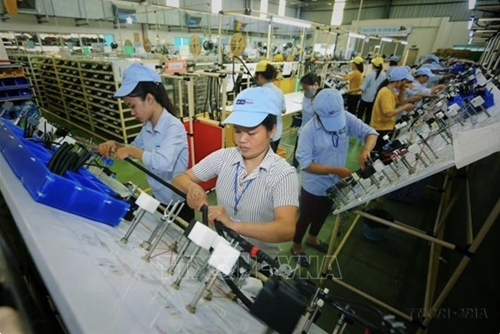The seminar attracted the participation of nearly 100 Vietnamese enterprises and associations operating in various manufacturing and export sectors, alongside Indian experts specializing in BIS procedures.
    |
 |
|
Production of electrical and electronic components at Minda Vietnam Auto Components Co., Ltd., an Indian-invested firm in Phu Tho province |
In his opening remarks, Bui Trung Thuong, Trade Counselor and Head of the Vietnam Trade Office in India, said that the seminar was designed to support Vietnamese manufacturing and exporting enterprises in better understanding India’s technical requirements and legal regulations, particularly regarding product certification – a prerequisite for lawful circulation of goods in the Indian market.
Thuong noted that the range of goods subject to mandatory BIS certification in India is extensive, covering products such as chemicals, iron and steel, toys, footwear, wooden and rubber items, among others. For Vietnamese businesses, acquiring accurate information and gaining a clear understanding of the certification process are the key to unlocking export potential in the Indian market, home to over 1.46 billion consumers, he underscored.
Meanwhile, Sudhanshu Rai from BIS under the Ministry of Commerce and Industry of India, provided a comprehensive overview of the Indian technical regulation system. This included the Quality Control Orders (QCOs) and the Foreign Manufacturers Certification Scheme (FMCS) overseen by BIS – mandatory for many categories of imported goods.
Rai elaborated the procedures, documentation requirements, associated costs and timelines involved in obtaining BIS Standard Mark Licenses or Certificates of Conformity (CoC). He also offered guidance on how Vietnamese enterprises can approach the FMCS, covering prerequisites such as factory assessments, laboratory standards, and the role of Authorized Indian Representatives (AIR).
Additionally, he updated attendees on the list of products currently under mandatory QCO certification, enabling businesses to proactively prepare and comply with Indian regulations, thus mitigating legal and commercial risks.
In the Q&A session, Rai addressed a number of practical concerns raised by Vietnamese enterprises regarding the certification process, technical barriers, and the preparation of application dossiers.
Concluding the event, Thuong reaffirmed the Vietnam Trade Office’s commitment to supporting Vietnamese enterprises in accessing the Indian market by meeting international standards, standardizing production processes and enhancing global integration.
He expressed his confidence that the insights provided at the seminar will facilitate a smoother BIS application process for Vietnamese firms, thereby contributing to the strengthening of economic and trade cooperation between Vietnam and India.
Source: VNA